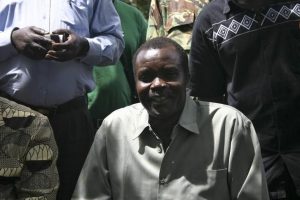By: Nikolaus Merz
Impunity Watch News Staff Writer
THE HAGUE, Netherlands – Following a procedural stay, the Office of Public Counsel for the Defense (“OPCD”) has submitted its response to the Prosecution’s request to hold an in absentia confirmation of charges hearing in the case against Joseph Kony.

The Prosecution’s unprecedented request was filed in November of 2022, and would seek to expand the scope of the International Criminal Court’s (“ICC”) procedural authority.
The Prosecution justified it’s request due to the extraordinary circumstances of Mr. Kony’s case. First, despite concerted efforts of multiple nations, including the deployment of armed forces and money rewards, Mr. Kony’s whereabouts have yet to be discerned. Second, Mr. Kony has remained at large for almost two decades, making him the second longest suspect at large of any international criminal court or tribunal. Third, the Prosecution points out the myriad of policy and judicial interests that would be advanced, including rights of victims, the galvanization of justice, and applicability to similar future circumstances.
The OPCD has responded to the Prosecution’s request with a broadside attack, raising numerous defenses against each of the Prosecution’s arguments. In general however, the OPCD raised two broad theories against the Prosecution’s request.
First, the OPCD argued the Prosecution misinterpreted the procedural justification for its request. The foundational treaty of the ICC, the Rome Statute, allows for in absentia confirmation of charges in two circumstances under Article 61(2)(a) and 61(2)(b). Article 61(2)(a) involves a situation where a defendant waives their right to in-person confirmation and is not relevant here. However, Article 61(2)(b) allows for in absentia confirmation in situations where the defendant “Fled or cannot be found…” and is the supporting procedural clause the prosecution used for its request.
According to the OPCD, the Prosecution has misinterpreted 61(2)(b) to mean simply any situation where a defendant cannot be apprehended or found. However, the structure of the Rome Statute, the intention of its drafters, and academic treatises indicate that 61(2)(b) is only meant to apply after an initial appearance by the defendant before the Court. Or, in other words, 61(2)(b) is meant to apply when a defendant has escaped ICC custody in an intermediary period between initial appearance and confirmation of charges.
In addition, the OPCD also argued that no reasonable efforts had been made to notify Mr. Kony of the charges against him. This argument is also based on interpretation of 61(2)(b) which differs from the prosecution. While 61(2)(b) allows for in absentia confirmation in cases where a defendant has fled or cannot be found, it also requires that reasonable efforts have been made to inform the defendant of the charges against them. The OPCD has argued that the only way for Mr. Kony to be made reasonably aware of the charges against him is to re-issue his arrest warrant and to broadcast it for a designated period of time.
Secondly, the OPCD argued that the Prosecution failed to carry its burden in showing that the circumstances of the Kony case were extraordinary enough to warrant in absentia confirmation of charges. The OPCD argued that the Prosecution gave no evidence to show that in absentia confirmation would support the policy considerations it put forth. Further, the OPCD argued that an extensive period of time to apprehend a suspect does not, by itself, demonstrate cause for in absentia confirmation of charges. Lastly, the OPCD pointed out that judicial and victim considerations had already factored into the Kony case in previous motions and decisions.
It should be noted that the representatives of the victims contacted the surviving victims regarding the Prosecution’s request; they were in unanimous support.
At present, it is uncertain if the ICC will support the Prosecution’s request. While the OPCD made compelling arguments, it is more likely that the Court will be considering the precedential ramifications of its decision more than anything. As the Prosecution stated, there would be potential to use in absentia confirmation of charges in similar future circumstances. To address the elephant in the room, a ruling in the Prosecution’s favor could raise uncomfortable questions for the Court regarding the situation of Mr. Putin, whom the ICC issued an arrest warrant for on March 17th 2023.
For further information, please see:
Reuters – ICC prosecutor seeks to revive case against fugitive Kony – 24 Nov. 2022